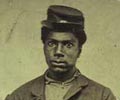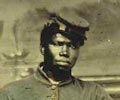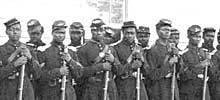








Black Soldiers


Of the Emancipation Proclamation's provisions, few were more radical in their implications than the enrollment of African-Americans into the Union army. By fighting and dying for the Union, black soldiers staked a claim to citizenship in the reconstructed nation that would emerge from the Civil War.
Before
the war, blacks had been excluded from the regular army and militia.
In 1861 and 1862, the Lincoln administration had rejected black volunteers,
fearing that white soldiers would refuse to serve alongside them.
With the
Proclamation, the enlistment of blacks began in earnest. By the year's
end, some 200,000 African-Americans had served in the Union army and
navy, the large majority of them former slaves.
Within the army, black soldiers were anything but equal to whites. Organized into segregated regiments under white officers, they initially received less pay than whites.
 |
Nonetheless, black soldiers played a crucial role not only in winning the Civil War, but in defining the war's consequences. The army, moreover, was a major source of postwar black leadership. |
Of
the African-Americans who served in Congress, state legislatures, and
other posts during Reconstruction, many had fought as soldiers and sailors
during the war
In his last public speech, shortly before his death in April 1865, President
Lincoln endorsed the idea of limited black suffrage, singling out army
veterans, along with the educated, as most worthy.
Copyright
2003